The early morning frost singed my fingers and toes during feeding time and as the day warmed up, we all thawed out in the midday sun. Safely ensconced at my mother’s Kwazulunatal ‘Horselovers Haven’, I was blissfully spending time in the herd, lying down with my horse in the grass and playing with him while he nuzzled my clothes looking for carrots!
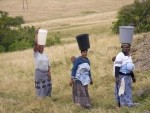
The clean air, eagles hovering overhead in the dome of blue sky above and the firm earth beneath my back held me in paradise. I was due to spend a few more days on the farm before my trip back to Cape Town to assist two clients at their chosen homebirths. The following morning I received an urgent call from one of the two clients, who was scheduled to endure an appearance in court that day, and knew I had to return to support her.
One of the most detrimental effects of the medicalization of childbirth and the system of encouraging all women to give birth in hospitals or clinics is the disengagement from the psychospiritual and social aspects of birth. The medical knowledge of childbirth focuses on the physiology of normal birth and more importantly the pathophysiology of abnormal birth. When birth goes well according to its normal physiology, there is actually no necessity for anyone at all to interfere or even be present. Birth will take place unassisted and mother and baby are likely to be healthy. For nearly all of the 2000000 years that modern human beings have been around on earth, women have given birth either alone or with other women in their homes or in nature.

Some of the earliest records of hospitals are from the Greek Aesclepian period and of maternity buildings for the slaves in the Roman era. The slave women’s children were allowed to stay with the mother for a set period of time and then taken away from the mother and placed in dormitories to be raised as slaves. The Romans understood that by interfering with the bonding and attachment processes during and after birth, they could control the minds of the children from a young age, preventing any chance of later rebellion from their system.  Estimated maternal death rates around this time were reported as between 1-3%, below the 10% currently recorded in Afghanistan, equalling the rate of maternal mortality in developing African countries south of the Sahara Desert, but far above the 0.04% rate of maternal mortality in modern developed countries. For the 1-10% of women who need them hospitals and medical assistance are life saving.
Estimated maternal death rates around this time were reported as between 1-3%, below the 10% currently recorded in Afghanistan, equalling the rate of maternal mortality in developing African countries south of the Sahara Desert, but far above the 0.04% rate of maternal mortality in modern developed countries. For the 1-10% of women who need them hospitals and medical assistance are life saving.
However, what this information suggests is that more than 90% of women over the 200 centuries of modern humanoid survival have survived to produce descendants up to the tune of 4 billion people presently living on the planet. This is despite the fact that civilizations have fought wars throughout the centuries, sweeping across the globe with whatever weapons they were able to manufacture and slaughtered wave after wave of peaceful human civilizations. Women have been giving birth in the home, on the farm, in the village, in the forest for centuries and have stoically continued to reproduce the species despite famine, war, drought, abandonment, rape and the pillaging of land and resources.
The above information also tells us that it is harder for women to give birth in postcolonial countries where they are malnourished, maltreated, and living in a war zone. There is an increase in maternal mortality not because women are not able, but because women are deprived of their rights to basic resources, such as clean water, nourishing food (NOT GM modified maize or sugar), shelter and safety and skilled birth attendants. The emphasis should be on providing women with access to their basic needs and access to skilled birth attendants, not herding them into hospitals where their psychospiritual and social needs may be violated by overworked staff who are unable to show empathy, who may impose rigid ‘delivery’ methods to streamline their system, or who focus on the technocratization of birth and disturb the relationship between mother and child.
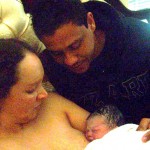
So, back to my story, well nourished, well supported women who have access to a skilled birth attendant are able to give birth at home safely. The baby is rightly born into the energetic space created between the mother and father and feels their welcoming emotions, is soothed by familiar sounds and immediately warmed and nourished by a mother’s breasts and a father’s care. He learns that to embark on a delicate journey may require courage and is rewarded by the success of a renewed relationship, a joyful reunion and happiness in the cocoon of his immediate social network and culture. Fahiema who gave birth in hospital for her first two children chose to stay at home this time and was rewarded with success and recovery in the comfort of her home. Shamiel leaned over his daughter’s ear to say his prayers and initiation into the Islamic faith. There were no bright lights, no other noises than his soft voice and he was performing this ritual from the throne of his own bed. Her mother was delighted to fuss over them and care for her daughter and new granddaughter, plying her with food and begging to hold the baby. My assistant and I were humble guests and respectfully resumed our duties thereafter.
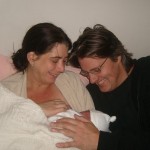
Julie gave birth to her first son 15yrs ago and at the age of 40 was delighted to try again! Her new son was born in a jiffy, very soon after I arrived at their home. I only just had time to run enough water into the bath for her planned waterbirth. Once the young Mr Ashman was given the go ahead, nothing could stop his speedy arrival and Julie and Peter were delighted to welcome him into their world. Julie was able to soothe him in her loving way and protect his integrity, Peter was able to have his baby skin to skin on his bare chest and feel his baby’s breath on his skin. Daniel, baby Ashman’s older brother took his turn and the circle was complete only after the dogs were invited into the room and introduced to the new family member.
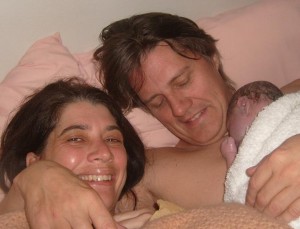
Neither baby was separated from their home, their parents or their culture. They were imprinted with the joyful and peaceful reception from their parents and siblings. They were not handled by strangers or given unnecessary examinations or injections. They did not bond to technology or the system, but are rooted in the matrix of universal love. I hope this will stand them in good stead in their lives, that the imprint of love, compassion and respect will sustain them far into the future.
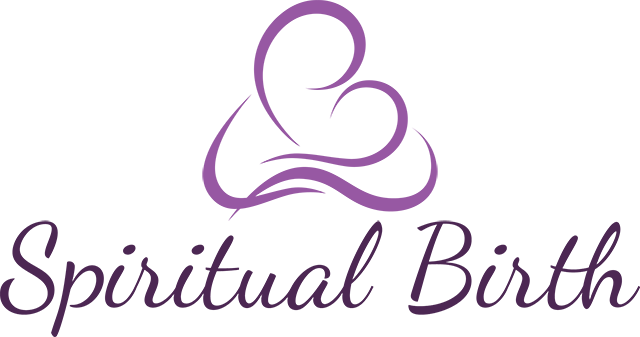

With all the successful homebirth stories, I’m so much surer that that’s where I want to be next time round.
Wonderful words Marianne! So heartfelt and right-on. Thank you for sharing.
Thank you for the in-depth information. I didn’t know much about it till I read your site. Well, it’s time spent well reading your article so much so that I’ve add to my favourites and will visit regularly and read what you have published. Excellent part!
Thank you for adding me to your favorites. I am really appreciative. Much love Marianne
wonderful article. thoughtful, well informed, erudite. One of my daughters, the first born of neo natal emergency twins, is now a specialist on premature twins and triplets. She is married to a pediatrican.
Andrea is now on the medical staff of my old university, (Monash) she speaks fluent french, and was speaking spanish when she was 7. before I first went to leeds, and Oxford Universities (philosophy).
I was at my first home birth in 1982, and brought information from America for the first white water birth, in australia.
A daughter in law is a research epidiemologist, and a son in law is a nurse.
We all love cricket as well.
I am presenting at Appah in san francisco this year.
Dear Deva Daricha
Thank you so much for your comment. I really appreciate any comments that are made about my site and blog. Fascinating and right that your daughter is now a twin specialist! It s lovely that you are presenting at APPPAH this year – I sadly am unable to attend this year as I am going to the IPA convention instead! Bless You!
Inspiration to all of us – doula s and student midwives